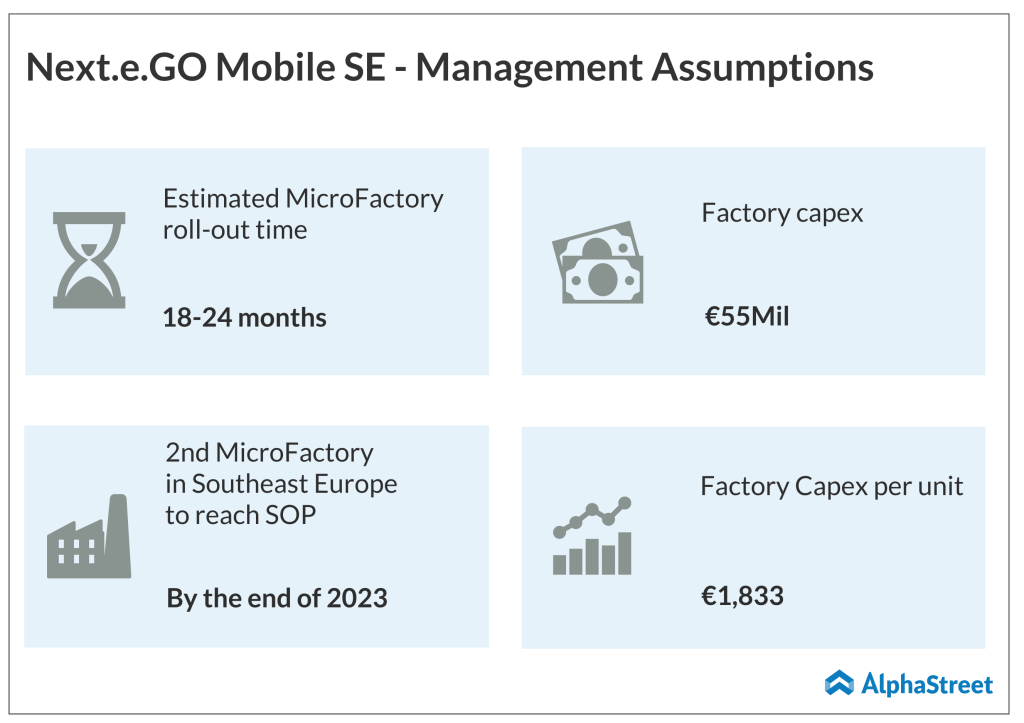Can you give a brief overview of the company?

Our mission at e.GO is to design and manufacture electric vehicles for the urban environment, with a focus on convenience, practicality, and smart services. We have a unique and innovative vehicle manufacturing strategy that enables us to develop and produce urban vehicles faster and with less capital investment compared to traditional vehicle manufacturing methods. e.GO has pursued this mission with an eye toward sustainable practices, driven by our unique and disruptive production facilities, which we call “MicroFactories.” We are already producing cars from our MicroFactory in Germany and e.GO has put more than 1,300 of its vehicles on the road to date.
How do you expect the business to benefit from the NYSE listing, in terms of taking growth to the next level?
As a public company, we plan to immediately elevate the opportunities and resources available to us as we continue on our path to scale our business, develop our teams, and provide our customers with our convenient and practical electric vehicles for the urban environment as well as our MicroFactory production system. We believe this highly strategic business decision is the best course of action to take because it allows e.GO to receive all the benefits that come from a listing on NYSE, while simultaneously setting the company up for a potential expansion of operations globally.
Can you explain the ‘low Capex production system’, and how is it different from the traditional manufacturing process?
At e.GO, we are united around the notion that sustainable and smart electric mobility was the answer to some of the biggest challenges facing the planet today. However, it was not that simple. Producing electric vehicles needed to be done thoughtfully, purposefully, and practically. To us, the root cause of some of these environmental challenges goes back to the unrestricted use of resources, the intrinsic limitation of existing infrastructure, and the resource requirements associated with large-scale production facilities.
Additionally, we believe that environmental sustainability is not economically sustainable and viable without some form of economic value add to the local communities and countries. With this in mind, we have built a platform, a product, and a production system that we believe is unique. Today we build what we consider to be one of the most sustainable urban battery electric cars – and according to our calculations, we do this by building the production facilities about 50 percent of the time and for less than 30 percent of traditional Capex as compared to the traditional industry. How are we doing this?
- First, German engineering and technology, which is known for reliability and quality.
- Second, we build cars in a different way using durable materials such as aluminum and polymers, while leveraging our innovative spaceframe and smart skateboard platforms.
- Third, our cars are purposely designed to meet the specific needs of urban customers with regard to convenience, flexible charging, integrated technology, and serviceability.
- And fourth our production technology and MicroFactories are designed to eliminate the need for some of the capital and energy-intensive steps in the traditional OEM process, which in turn reduces capital outlay, facility footprint, as well as energy demand – things that today are a lot more front and center as we look towards a more sustainable future.

Currently, do you have plans to set up MicroFactories outside Europe?
Yes, we are a global company and we do envision MicroFactories being developed outside of Europe in the future. We believe our business model offers many attractive benefits to local economies around the world and to e.GO. For instance:
- A decentralized footprint provides e.GO with a potential hedge against global disruptions.
- By establishing local roots, we can enhance the “In-Country Value-Add” we bring to each individual geographic location.
- Our innovative technology attracts local talent and can spark job creation and economic benefits.
- Our sustainable model can potentially provide eligibility to access local subsidies and benefits.
- We can also offer a potential reduction in transportation costs overall as well as a more favorable import tariff.
Where do you see Next.e.GO Mobile five years from now?
It’s impossible to say with any certainty where anyone will be five years down the road, but when we think about the future of e.GO – there is a lot to be excited about. We envision that e.GO will continue to drive the transition to global, emission-free, and urban mobility with its innovative, sustainable, and durable electric vehicles. Our MicroFactories will continue to bring production closer to the market while creating economic value for local communities. As part of its decentralized and global growth strategy, e.GO recently announced a MicroFactory in North Macedonia and is planning to build new MicroFactories in other emerging and growing economies as well.
Lightwave Logic will license technology to make its polymers ubiquitous: CEO Dr. Michael Lebby
Furthermore, the recent positive developments in the U.S.A. including the introduction of the Inflation Reduction Act encouraged us to consider establishing a MicroFactory in the U.S. as well. We also expect to see increased interest in using e.GO electric vehicles for commercial purposes – including last-mile urban delivery, carpool services, and healthcare services.
It’s clear that the world is focused on more sustainable solutions for transportation – making the adoption of electric vehicles essential. And that’s exactly where e.GO can provide value. We offer an affordable electric vehicle designed for the urban environment with a manufacturing strategy that is designed to reduce emissions and deliver value to local communities.
